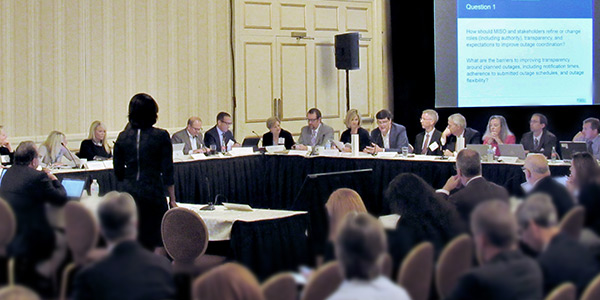By Amanda Durish Cook
ST. PAUL, Minn. — MISO’s Advisory Committee appeared split last week over whether the RTO should assume greater authority in granting planned outages, with many members offering alternative and complementary ideas to increased outage control.
Following a tradition established three years ago, the Sept. 19 Advisory Committee “hot topic” discussion began with a theme song.
“I couldn’t find a song with ‘maximum generation alert,’” MISO Director of Resource Adequacy Coordination Laura Rauch said to laughter.
She eventually settled on Stealers Wheel’s “Stuck in the Middle with You” to capture the situation.
“We have a generally aging generation fleet, and that’s increasing outages and worsening coordination of those outages,” Rauch said.
According to its Business Practices Manual, MISO can only “recommend [an outage] schedule that maintains system security and minimizes adverse impacts.” But in its 2016 State of the Market report, the Independent Market Monitor raised the need for MISO to have a bigger say in outage scheduling, kicking off an off-and-on discussion ever since. (See “Generation Outages,” MISO in Harmony with IMM State of the Market Report.)
Discussion moderator Julia Johnson, president of regulatory advising firm Net Communications, took a more optimistic approach, playing “The Power” by Snap!
“We’ve got to figure out who is ‘the lyrical Jesse James,’” Johnson said, urging stakeholders to offer their best ideas to minimize outage impacts.
Some Advisory Committee members said the situation has become such that MISO members cannot effectively coordinate outages to avoid emergency conditions.
But Minnesota Public Utilities Commissioner Matt Schuerger said the Organization of MISO States does not support giving MISO expanded authority in approving outages, with the group saying that the RTO should “articulate a compelling need before any new authority is considered.” OMS maintains that MISO already is allowed to analyze generator outage requests and recommend outage scheduling changes as needed.
Kevin Murray, representing the Coalition of Midwest Transmission Customers and MISO’s Eligible End-User Customers sector, said he understood regulators’ hesitancy to “turn over the keys to the car.” But he said in his 27 years in the business, he had never seen MISO call a NERC Level 2 emergency like the one seen during the previous week. (See MISO in Conservative Ops After Emergency Declaration.)
“We shouldn’t be having these events on a Saturday. We need to do some soul searching,” Murray said. He also pointed to FERC and NERC’s recently announced inquiry into the January cold snap that resulted in generation outages and loads that approached summertime levels in MISO South. (See FERC, NERC to Probe January Outages in MISO South.)
“The writing is on the wall. … Either we do something, or they do something,” he said.
Several stakeholders said MISO should act to better coordinate outages before winter arrives, saying solutions from its comprehensive Resource Availability and Need project will arrive too late to avoid another outage-related emergency.
Clean Grid Alliance Executive Director Beth Soholt, of the Environmental sector, said MISO should study the cost of outages on the system. Robert Mork, of the Indiana Office of Utility Consumer Counselor, reminded executives of a mission statement that includes cost consciousness.
Murray said MISO might consider obtaining dispatch control of smart thermostats and electric vehicle charging stations to lower load when needed. “I would encourage people not to think about this one-dimensionally,” he said.
North Dakota Public Service Commissioner Julie Fedorchak suggested MISO begin collecting aggregate load and generation availability estimates from utilities for both the month and week ahead.
Wisconsin Public Service’s Chris Plante, of the Transmission-Dependent Utilities sector, pointed out that in some weeks, MISO’s maintenance margin is a negative number, indicating that generation operators have already taken too many outages. The RTO’s maintenance margin shows the amount of generation that can be taken out of service for a given time period without risking resource adequacy.
Representing the TDU sector, Madison Gas and Electric’s Megan Wisersky said it also believes MISO shouldn’t be handed control over outage scheduling.
“You want your unit on to make money from it. Generators tend to be very unique beasts, and you may only get consultants and specialists on your site at a specific time,” Wisersky said. “When MISO asks a unit to come off an outage, the unit is sometimes in pieces on the turbine floor. We’re not capricious in this … they’re not casual decisions.”
Murray said MISO’s new capacity advisory warning is a good step to help mitigate the effects of outages because units, if ready, will want to re-enter the market to scoop up the better prices available in a capacity shortage.
Multiple stakeholders said they would like MISO to attach economic signals to outage timing. Murray said the RTO could add to its markets an additional economic demand response product, which identifies a price to incent some load to get off the system. He also encouraged discussing an economic consequence if generation resources are unavailable during peak times. He brought up PJM’s Capacity Performance rules, though he said he wasn’t advocating use of a similar penalty in MISO.
Plante said MISO should revisit its proposal to create a seasonal capacity market to get a better idea of resource availability. He said MISO’s current capacity accreditation based on the summertime peak might not be the best route for resources such as wind facilities, which have their most productive months outside of summer.
Michael Curran, chair of the MISO Board of Directors, urged the RTO and stakeholders to “get everything on the table,” suggesting that the solution to poor outage coordination will be multifaceted, with more entities assuming more outage authority.







